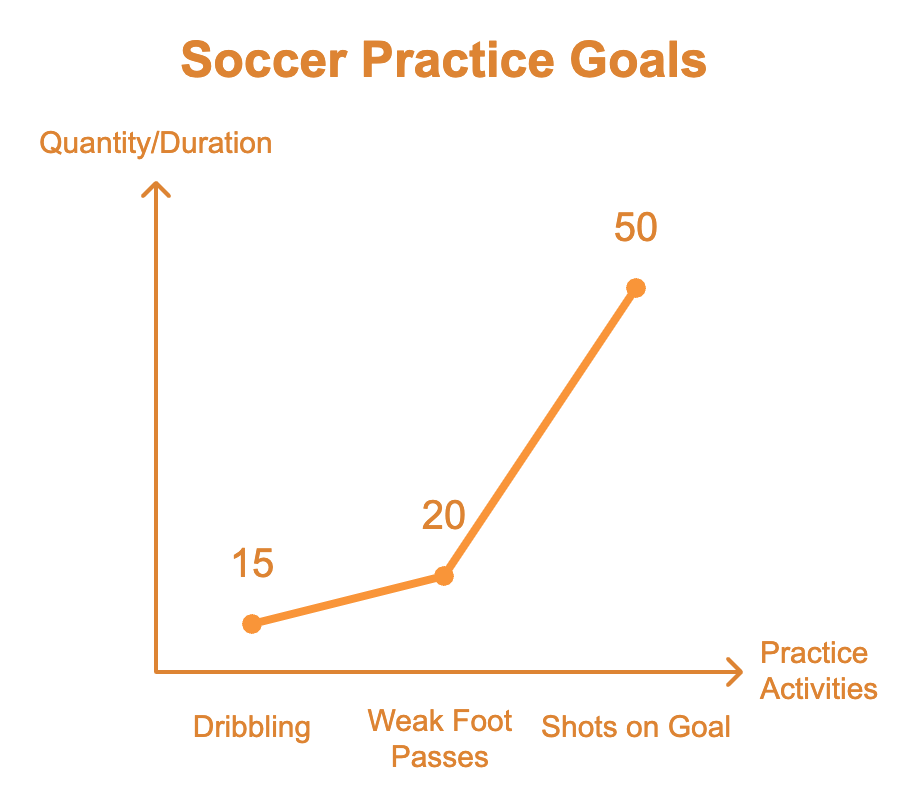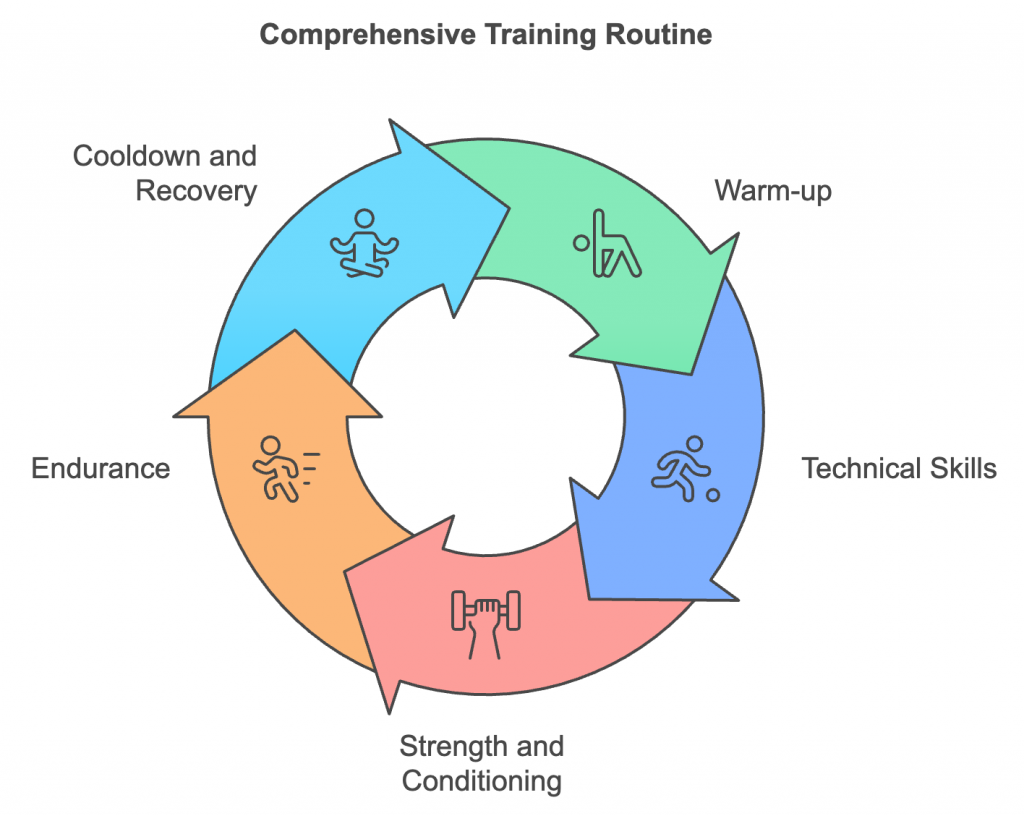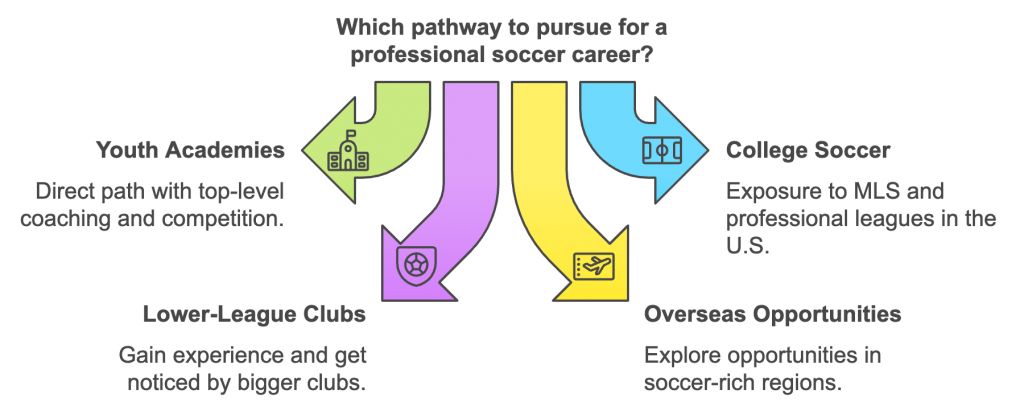How to Become a Professional Soccer Player
Becoming a professional soccer player takes passion, hard work, and smart decisions. Start young by training consistently and playing in youth leagues or academies. Focus on expanding your skills, fitness, and understanding of the game. From there, climb the ranks by joining local or semi-professional teams, competing, and standing out to scouts. Eventually, you’ll need to get noticed by professional clubs, attend tryouts, and prove your talent. It’s an arduous journey, but you can make it happen with dedication and the right opportunities.
Want to know more? Keep reading to dive into each step and get all the tips you need to boost your chances of success!
Start Young and Build Your Skills
We should note some facets if you want to go pro:
- Start playing as early as possible.
- Join a local youth team or academy where you can play regularly and train under good coaches.
- Focus on building essential skills like dribbling, passing, shooting, and defending.
The more time you spend on the ball, the better you’ll get.
Don’t just play for fun—train seriously. Set simple, trackable goals each week. For example, aim to practice dribbling for 15 minutes a day, improve your weak foot by making 20 passes with it, or take 50 shots on goal after practice. Challenge yourself with small-sided games, futsal, or even practicing independently. The key is consistency, so train at least 2-3 times a week and always investigate how to level up.

The earlier you start, the more time you have to develop and get ahead of the competition. Keep pushing your limits and stay focused on your dream!
Join a Competitive Youth Academy
Do not overlook that joining a competitive youth academy is essential to boost your chances of going pro. These academies provide structured training, better coaching, and opportunities to play against top talent. For example, top players like Lionel Messi and Marcus Rashford started their careers in club academies, where they honed their skills before breaking into professional teams.
Look for local academies with a good track record or even professional club academies if available in your area. In the U.S., you might aim for Major League Soccer academies, while in Europe, clubs like Barcelona, Manchester United, or Ajax offer world-class programs for youth development.
Playing in an academy exposes you to scouts, advanced tactics, and more intense competition. You’ll also have opportunities to play in high-profile youth tournaments, where performing well could catch the attention of professional clubs. A dozen professional players, like Trent Alexander-Arnold, got recruited directly from their club’s academy system.
At this stage, focus on consistently improving your game. Attend every training session, take feedback seriously, and work on any weaknesses. The goal is to stand out and ensure you’re always according to scouts and coaches.
Train Like a Pro
To become a professional soccer player, you need to train like one. This means dedicating time on and off the field to perfect your skills, improve your fitness, and sharpen your mental game. Top-notch players like Cristiano Ronaldo are known for their intense training routines, including regular practice with their teams and personal conditioning sessions.
To start, train at least 5-6 times a week, focusing on technical skills (like dribbling, passing, and shooting) and physical fitness. A typical training session could include drills for speed and agility, strength exercises, and endurance work. Don’t forget to include recovery days and stretches to avoid injuries—they are key to a long-lasting career.
You also need to focus on your diet and rest. Just like pros, fueling your body properly with balanced nutrition and getting enough sleep are critical for performance. Most top players sleep 8-9 hours a night and maintain a strict diet to keep their energy levels high and their bodies in peak condition.
Remember, consistency is key. Whether on the field or at the gym, train with the same intensity you would if you were already a professional. Every small improvement gets you closer to achieving your dream.
Soccer Workout Routine to Boost Skills
Here’s an example of a balanced training session that you can follow to improve both your skills and fitness.
This regular-based routine will boost your technical skills and physical fitness, helping you get closer to your dream of playing professional soccer.

Get Noticed by Scouts
Talent alone won’t get you to the pros—you need to be seen by the right people. Scouts constantly look for new talent, but you must position yourself to catch their attention. Here’s how you can make sure they take notice.
Initially, get involved in competitive leagues or join a well-known soccer academy. Scouts frequently attend games at places like the Barcelona Academy or Ajax Youth Academy, where stars like Lionel Messi and Matthijs de Ligt were discovered. Academies often host trials or tournaments where scouts from top clubs come to watch.
Take Christian Pulisic, for example. He played in local leagues in the U.S. before moving to Borussia Dortmund’s academy, where he was quickly scouted and signed. Similarly, Jamie Vardy worked through lower-tier teams until Leicester City scouts spotted him.
On top of that, attend open trials or soccer camps that are specifically designed to attract scouts. Plenty of examples of players, like Harry Maguire, started by attending trials for local teams before working their way up to the professional level. Creating a short highlight video of your best moments can also help—players like Jack Harrison used videos to gain attention from top-tier teams playing in the U.S. before joining Manchester City.
Finally, network. Building relationships with coaches, trainers, and other players can open doors. A coach who sees your potential might connect you with scouts or clubs.
Build a Winning Mindset
A strong mindset is just as important as physical skills when aiming to become a pro. Players like Zlatan Ibrahimović and Sergio Ramos stand out for their talent and mental toughness, helping them stay focused and handle pressure.
Start by setting clear, achievable goals. Break them into smaller tasks, like improving your weak foot or learning a new skill. Jamie Vardy’s rise from non-league football to the Premier League shows how persistence and small improvements can lead to big success.
Setbacks, such as injuries or losing streaks, are inevitable. The key is resilience. Look at Harry Kane, who returned from early career injuries to become a top scorer. Visualization is another powerful tool. Plenty of players, like Marcus Rashford, mentally rehearse key moments before games, which boosts confidence on the field.
Finally, keep in mind that soccer is a team sport. Scouts look for players who lift their team, not just individual stars. Stay positive and contribute to the team’s mental and physical success.
Network and Create Opportunities
In soccer, it’s not just about what you know but who you know. Building connections is key to finding new opportunities, whether it’s through coaches, scouts, or fellow players. Countless professional players got their big break through the network they built.
Attend as many soccer camps, tournaments, and showcases as possible. These events are great places to meet scouts and coaches who could open doors for you. Take, for example, Christian Pulisic, who was scouted while playing in youth tournaments before being invited to join Borussia Dortmund’s academy.
Don’t hesitate to contact coaches, agents, or clubs with your soccer résumé and highlight reel. For instance, we can describe the story of Alphonso Davies. His way is a brilliant example of a player who didn’t wait for opportunities but actively created them. Born in a refugee camp in Ghana, he moved to Canada at age five. His talent and hard work caught the coaches’ attention while playing in youth leagues. At just 15, he became the youngest player to sign a contract with the Vancouver Whitecaps (MLS).
Remember, making connections with other players is just as important. Joining soccer communities, both online and offline, can introduce you to people who know about trials, open tryouts, or even teams looking for new talent. By networking and creating opportunities, you’ll boost your chances of being seen by the right people and possibly making your dream of becoming a professional soccer player a reality.
Explore Different Pathways
There isn’t just one way to make it to the professional level. Players have various paths depending on where they start and the opportunities available. Let’s explore a few common routes:
Each path has challenges, but finding the right one for you can bring you closer to becoming a professional soccer player.

Conclusion
It is challenging to be called a professional soccer player since this way requires hard work, constant physical activities, and smart decisions. Stay focused, keep improving, and embrace every opportunity in your journey.
Every step matters, from starting in youth leagues and honing your skills to networking and creating opportunities. Remember, talent alone isn’t enough—training like a pro, building connections, and staying mentally strong are all crucial aspects of achieving your dream.



